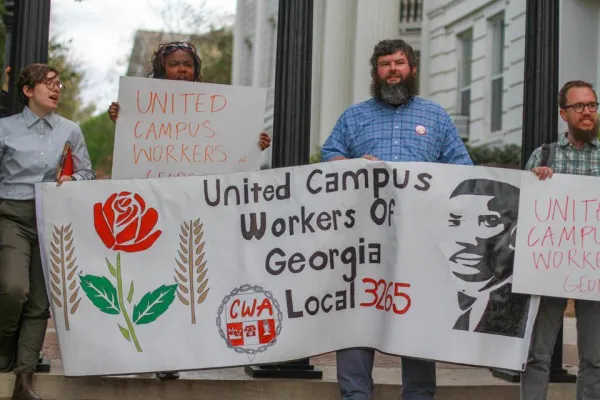UGA union members fear Comprehensive Administrative Review will lead to job cuts
Workers at public universities across Georgia feel their jobs and ultimately public higher education is threatened by a Comprehensive Administrative Review the University System of Georgia is in the process of conducting.
USG began an evaluation process of nonfaculty administrative functions in 26 universities across Georgia, and the University of Georgia is the last school in the lineup. The process, which began data collection in September 2017, has required staff from departments ranging from financial aid, information technology, libraries and academic affairs, to name a few, to fill out a survey of their duties. This process is led by Huron Consulting Group, a third-party organization that analyzes the data from the surveys and makes suggestions to cut costs and increase efficiency.
Staff members from UGA, Kennesaw State University, Georgia Southern and the University of Texas were present during a digital town hall hosted by the United Campus Workers of Georgia at 6 p.m. on Oct. 16. Members from each university present had issues with Huron evaluating their jobs’ functions, fearing an intent to potentially eliminate their positions.
Chris Powers from the Georgia Southern University Armstrong campus works in the library department. He completed the evaluation this past summer and said he and his colleagues had difficulties identifying what the survey was and how it applied to them, saying none of the questions seemed tailored to their work functions.
“It was worded in a way that really didn’t seem to apply to library workers, and I imagine other workers or staff probably felt the same way across campus. We had to figure out ways to answer this survey and translate it to our experiences here,” Powers said.
Lance Wallace, interim associate vice chancellor for communications for USG, told The Red & Black “the University System of Georgia’s Comprehensive Administrative Review is focused on improving administration through creating efficiencies, streamlining processes and finding ways to be more effective with system resources” in an email.
Annelie Klein, a student affairs professional at UGA and steering committee member of UCWGA, said she felt poorly represented by the survey and under informed by UGA.
“With all of the resources that we have at UGA, why in the heck weren’t we coordinated with? Why weren’t we given the opportunity to know more about this? Especially if our jobs are on the line,” Klein said.
If anyone knows what could be done to make things more efficient, it’s the people actually working in the departments, Klein said.
“Why not give us an opportunity or floor to be able to express those ideas?” Klein said.
According to USG’s website, the CAR is designed to “identify opportunities for savings through a combination of more efficient and effective processes... realignment of positions and the restructuring and centralizing of certain operations.”
Something participants of the digital town hall found particularly concerning is that Huron wants to begin relationships with universities as a consultant but tries to sell universities Huron Technologies services — web-based software solutions for research administration — essentially filling a gap one of their proposals may have created.
The review was launched in April of 2017 and is scheduled to take two years and each of the 26 USG institutions are on different timelines depending on when the processes began at each campus.
“Actions plans for implementation of Huron’s recommendations are expected to be finalized on a rolling basis 90 days after each campus receives their report,” according to research conducted by Kate Diedrick.
Diedrick, a hired researcher for United Campus Workers presented some of her findings during the town hall, some of which showed results from processes similar to CAR across the country. It’s not just about the review but also action plans that follow in the implementation, Diedrick said.
Anne Lewis, a senior lecturer at the University of Texas at Austin, said her colleagues worked with Texas State Employees union against the implementations Accenture, a group similar to Huron, brought to the university. Lewis recalled the death of a child came about as a result of staff movement to shared service centers back in 2007.
Lewis said clerical workers who had been working in health and human services were replaced with a call center where people were unable to go in to talk to them. The call center mistakenly provided the wrong email address for people to send their documentation to, and as a result, mother Tamika Scott was unable to attain health insurance for her 14-year-old son, Devante Johnson. Johnson passed away because he was unable to receive the chemotherapy treatments he needed.
Accenture, a consultant group similar to Huron, made suggestions to the University of Texas to cut costs and increase efficiency. When the union Lewis is a part of pushed back against the university’s implementations of Accenture’s recommendations, she could think of one person who was negatively impacted. Overall, however, she said the pushback was worth it as they were able to prevent a move to an all encompassing centralized Shared Services Center.
“If you don’t fight them you’re going to be screwed, and if you do, you might be,” Lewis said.
The town hall ended with a call to action for employees from universities across Georgia to unite with UCWGA to counter USG’s initiatives with Huron.
The data collection will end December 2018, and all results of the CAR will be published by April 2019.

Georgia public universities’ ‘return to office’ mandate may spark exodus
Get Involved: CWA Black History Month Town Hall


